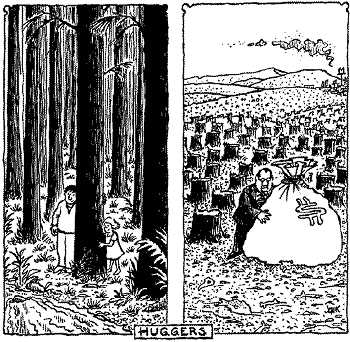|
||||
|
|
|
|||
| Home | Subscribe | Back Issues | The Organization | Volunteer | ||||
|
||||
Judge Upholds Protections for Old-Growth ForestsBush administration plan must be reconsideredfrom Cascadia Rising!The Bush administration's decision to eliminate safeguards that protected old-growth forests has been declared illegal by a federal judge in Seattle. The judge preserved the "Survey and Manage" rules under the Northwest Forest Plan, which require federal agencies to survey an old-growth area for rare plants and wildlife before allowing logging or other destructive activities, and if found, modify their plans to reduce the risk of extinction. "This is a huge victory for people who value wildlife and the old-growth forests of the Pacific Northwest" said Doug Heiken on Oregon Natural Resources Council. "It's time for the Bush administration to recognize that Oregonians value our natural heritage and want to see it protected." "This ruling helps preserve an important system of checks and balances that protects our old-growth forests for wildlife, clean water, and future generations," said Joseph Vaile of Klamath Siskiyou Wildlands Center. Judge Marsha Pechman of Seattle ruled that "even though the Survey and Manage standard was only a part of the overall strategy to protect these species, it was a necessary part to satisfy the [Northwest Forest] Plan's 'foundational objectives.'" Dominick DellaSala, a PhD forest ecologist with the World Wildlife Fund, explains how the rule protects a delicate web of life. "There are hundreds of species that are essential to the health of old-growth forests by cycling nutrients and cleaning our air and water." DellaSala explains, "The Survey and Manage program, developed by some of the best scientific thinkers in the region, is a global model of conservation because it recognizes this important fact." The United States Forest Service and Bureau of Land Management estimate that without the Survey and Manage rules, more than 50 species are at high risk of local extinction. Without the rules, old-growths forests across Oregon, from the slopes of Mount Hood, to the headwaters of the McKenzie River, to the Wild and Scenic Rogue River were all at greater risk from logging. The Bush administration attempted to eliminate these and other safeguards as part of a settlement agreement with the logging industry over a lawsuit which logging interests filed in 2001. For more information contact Doug Heiken, Oregon Natural Resources Council (541) 344-0675; Dr. Dominick DellaSala, World Wildlife Fund (541) 482-4878; Joseph Vaile, Klamath Siskiyou Wildlands Center (541) 488-5789.
Logging Plan Halted in Old-Growth ReserveStudies show that logging increases fire risk, pollutes streamsfrom Conservation NorthwestThe Spokane federal district court in late July halted logging plans in an old-growth reserve and other areas on the Okanogan-Wenatchee National Forest near Leavenworth, Washington. Conservation groups had requested the injunction after federal reviews showed that the Fischer Fire Economic Recovery Project would increase fire risk, pollute drinking water supplies, and irreparably damage old-growth reserves. The temporary delay prevents the timber sale from being cut while the court evaluates the Fischer Project and considers additional action. The Fischer Project would give the large older trees to the timber industry and leave behind a wasteland of logging slash and brush that fuel wildfires, "placing old-growth forests and local communities in harms way," said Regan Smith of Conservation Northwest. The Fischer Fire Economic Recovery Project has authorized three timber sales that cut large old trees across 2,500 acres of national forest burned by the Fischer Fire in August 2004. The court's temporary stay applies to only one, the Rollin Rock sale. "It's a shame. The Forest Service could have pursued a balanced approach that reduced fire risk, got logs to local mills, protected public resources, and garnered broad community support," said Dave Werntz, Science and Conservation Director at Conservation Northwest. "Instead, they chose a reckless path that threatens property, wildlife, and water quality. For more information contact Regan Smith 206-349-1032 or Dave Werntz 360-319-9949, both of Conservation Northwest. |
|

